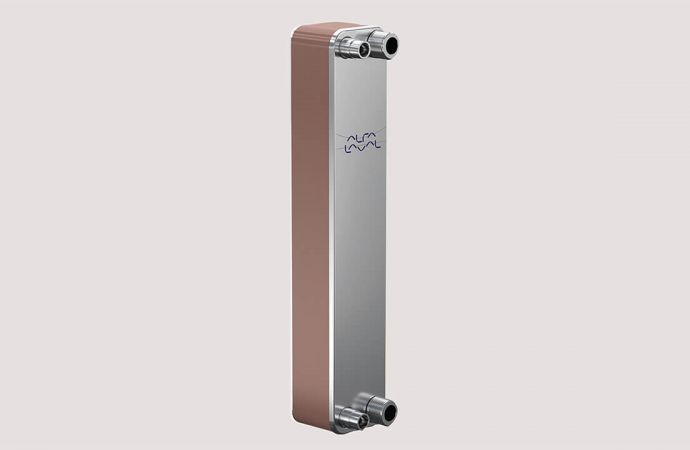The new unit can reduce the number of condensers in a retail display case from three to one, the company says.

The CB24 plate heat exchanger from Alfa Laval.
Swedish manufacturer Alfa Laval has expanded its brazed heat exchanger portfolio with the introduction of CB24, an efficient, low-charge propane (R290)-optimized condenser.
The company describes it as the first dedicated R290-optimized condenser on the market.
The CB24 heat exchanger is designed to combine “unprecedented” low refrigerant charge and increased heat transfer efficiency, thus improving sustainability by lowering the carbon footprint. The model is suitable as both evaporator and condenser for heating and cooling applications, including commercial refrigeration display cases, ground source heat pumps (GSHPs), satellite systems for tap water, and more.
The reduced refrigerant charge makes the CB24 a good choice in locations where legislation can make the use of flammable refrigerants challenging, according to Alfa Laval. Last year, the International Electrotechnical Commission (IEC) increased the maximum allowable R290 charge in retail display cabinets from 150g to 500g.
“The aim of CB24 has been to solve these challenges for some of the heating and cooling duties where the ability to use R290 will become increasingly critical,” said Fredrik Ekström, President for Business Unit Brazed & Fusion Bonded Heat Exchangers at Alfa Laval. “We did this by adapting some of the unique innovations Alfa Laval has developed through our long experience in these applications. This has given us a dedicated condenser that successfully accommodates the refrigerant charge limitations of working with propane, without sacrificing thermal performance.”
With CB24, the ability to use propane with a reduced refrigerant charge is “only half the story,” Ekström stressed. “The possibility to improve thermal efficiency will also create new opportunities for energy savings for many of our customers.”
An example of this is vertical commercial refrigeration cabinets without doors. Up to three condensers would normally be required for such applications, but with the CB24 only one unit is necessary due to the increased efficiency, Alfa Laval said.
“The results are equally positive for geothermal applications,” Ekström said. “We have already installed our first CB24 condensers in a GSHP system in southern Europe. The customer has reported that both the low refrigerant charge and the high efficiency of the system is far in front of everything else they are seeing on the market today.”
Patented plate design
The CB24 is created using Alfa Laval’s patented FlexFlow plate design technique, which allows for custom-tailored asymmetric channels. The FlexFlow technique makes it possible to increase turbulence and optimize the pressure drop to each particular application, thereby increasing the overall heat transfer efficiency while using a lower charge.
“This means, for example, that CB24 easily meets the strict regulations for some commercial refrigeration applications, which limit a propane charge to 500g,” said Ekström, adding that “CB24 can even fulfill the much more stringent requirements for GSHPs, which in Europe are limited to a refrigerant charge of just 150g.”
The CB24 also features Alfa Laval’s PressureSecure design. This “optimizes the relationship between thermal, mechanical and material properties to support pressure loads associated with R290,” according to the company’s website. The overall result is a more robust heat exchanger, especially around the port areas, which can be very susceptible to pressure-related fatigue problems.
Alfal Laval is moving its brazed heat exchanger production to a new factory, as announced in a press release on November 23. The move aims to increase production capacity and improve customer experience.
We have already installed our first CB24 condensers in a GSHP system in southern Europe. The customer has reported that both the low refrigerant charge and the high efficiency of the system is far in front of everything else they are seeing on the market today” - Fredrik Ekström, Alfa Laval
Related stories




